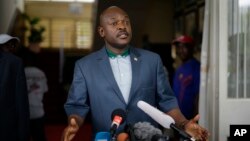Burundi President Pierre Nkurunziza has made his first public appearance since a coup attempt last week.
At a news conference Sunday at the presidential palace in the capital, Bujumbura, the president did not mention the failed coup plot or the protests over his bid for a third term in office.
Instead he described talks with presidents of nearby African countries on threats from Somalia's al-Shabab militants, who have warned of attacks against Burundi and other nations
that contribute troops to the African Union force in Somalia.
"We are very preoccupied by the attack by al-Shabab," he said. "It was an aim to look at ways, strategies and dynamics to stop these attacks which might threaten the security of Burundians and that is why we are here taking this menacing issue of the al-Shabab very seriously."
President Nkurunziza was in Tanzania for a regional summit on Burundi's political situation when General Godefroid Niyombare announced the coup attempt Wednesday. The move followed weeks of unrest after President Nkurunziza said he would seek a third term. Violence surrounding the protests left at least 14 people dead and more than 200 wounded.
Despite his return, the capital remained calm on Sunday, although activists are expected to restart demonstrations this week.
In Rome on Sunday, Pope Francis called for a sense of responsibility to prevail in Burundi following the attempted coup.
"I would like to invite you to pray for the dear people of Burundi, which is undergoing a delicate moment. May the Lord help all to avoid violence and act responsibly for the good of the country,'' he said.
In a radio address Friday, President Nkurunziza thanked his security forces for stopping the military coup against his government. He also warned protesters to stop their demonstrations against his decision to seek a third term.
The president and his supporters argue that a third term is permitted because he was elected by parliament, not voters, for his first five-year term in 2005. Burundi's constitutional court has sided with the president.
The U.S. has said Nkurunziza should not stand for a third term. U.S. Assistant Secretary of State Linda Thomas-Greenfield told VOA that the decision has caused instability in the country.
The U.S. State Department has called for Nkurunziza "to condemn and stop the use of violence by the police and the ruling party's Imbonerakure youth militias against those who participated in protests against a third term." State Department spokesman Jeff Rathke said the U.S. is taking steps to impose visa ineligibilities on those responsible for violence.
A Burundian presidential spokesman told VOA's Gabe Joselow that the leader of the coup attempt, General Niyombare, remains at large and is believed to be in hiding.
The United Nations says more than 105,000 people have fled Burundi to Tanzania, Rwanda, and the Democratic Republic of Congo since Burundi's unrest began three weeks ago.
A spokesman for the U.N. refugee agency, Karin de Gruijl, says the living conditions for those fleeing is extremely dire in some areas. He says more than 50,000 Burundians are now living on the shore of Lake Tanganyika, on the border with Tanzania, and says the lack of clean drinking water, latrines and shelter there is acute.
Some material for this report came from AP and AFP.





